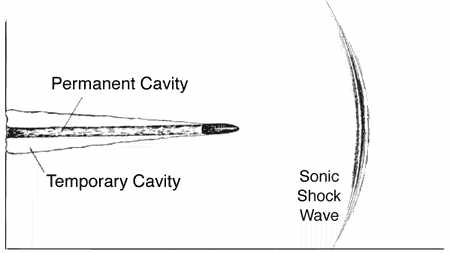|
Medical Education Division |
Operational Medicine 2001
Second United States Revision of The Emergency War Surgery NATO
Handbook
United States Department of Defense
Home · Military Medicine · Sick Call · Basic Exams · Medical Procedures · Lab and X-ray · The Pharmacy · The Library · Equipment · Patient Transport · Medical Force Protection · Operational Safety · Operational Settings · Special Operations · Humanitarian Missions · Instructions/Orders · Other Agencies · Video Gallery · Phone Consultation · Forms · Web Links · Acknowledgements · Help · Feedback
|
Emergency War Surgery NATO Handbook: Part I: Types of Wounds and Injuries: Chapter II: Missile-Caused Wounds Mechanisms of WoundingUnited States Department of Defense The penetrating missile or fragment destroys tissue by crushing it as it punches a hole through the tissue (Figure 3). This hole or missile track represents the so-called permanent cavity. The cross-sectional area of the missile track is comparable to the presenting area of the missile and its dimensions are roughly the same for all soft tissues. After passage of the projectile, the walls of the permanent cavity are temporarily stretched radially outward. The maximum lateral tissue displacement delineates the temporary cavity. Any damage resulting from temporary cavitation is due to stretching of the tissue. Resistance or vulnerability to stretch damage depends mostly on tissue elasticity. The same stretch which causes only moderate contusion and minor functional changes in relatively elastic skeletal muscle, can cause devastating disruption of the liver. The result of temporary displacement of tissue is analogous to a localized area of blunt trauma surrounding the permanent cavity left by the projectile's passage. The typical wounding potential of a given missile can be assessed by measuring the two types of tissue disruption it produces. A method developed by U.S. Army researchers captures the entire path of missiles fired through gelatin tissue-simulant blocks. Measurements taken from the gelatin are used to illustrate the location and the extent of both crush and stretch types of tissue disruption on a drawing or "Wound Profile." The scale included on each profile can be used to measure the extent of tissue disruption on a drawing at any point along the path of the projectile. This method allows comparison of the wound profiles of different of different wounding agents. The sonic shock wave seen at the far right of Figure 3 precedes the projectile's passage through the tissue. Although the magnitude of the sonic wave may range up to pressures of 100 atmospheres, its duration is so brief, about 2 microseconds, that it does not displace tissue. It has no detectable harmful effect on tissues.
Approved for public release; Distribution is unlimited. The listing of any non-Federal product in this CD is not an endorsement of the product itself, but simply an acknowledgement of the source. Operational Medicine 2001 Health Care in Military Settings
This web version is provided by The Brookside Associates Medical Education Division. It contains original contents from the official US Navy NAVMED P-5139, but has been reformatted for web access and includes advertising and links that were not present in the original version. This web version has not been approved by the Department of the Navy or the Department of Defense. The presence of any advertising on these pages does not constitute an endorsement of that product or service by either the US Department of Defense or the Brookside Associates. The Brookside Associates is a private organization, not affiliated with the United States Department of Defense. |
